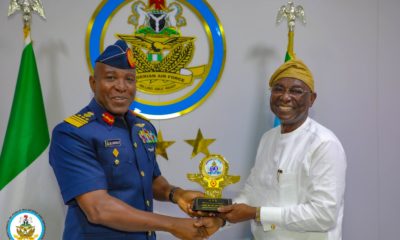Maritime
Regional Collaboration: Ghana Understudies Nigerian Cabotage Regime

By Biztellers
The Ghanaian Maritime Authority GMA has commenced a 10- Day program to understudy the implementation of the Coastal and Inland Shipping Act also known as the Cabotage Law in Nigeria under a collaborative arrangement with the Nigerian Maritime Administration and Safety Agency, NIMASA.
The Director General of NIMASA, Dr Bashir Jamoh OFR, while addressing the Ghanaian delegation, expressed delight at the opportunity to share knowledge on Cabotage implementation noting that it will not only enhance regional collaboration, but also have a multiplier effect of increasing local participation in the regional maritime industry.
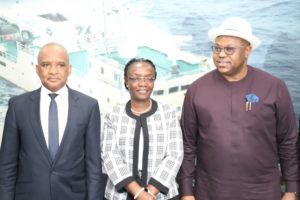
L-R: Director General, Nigerian Maritime Administration and Safety Agency (NIMASA), Dr Bashir Jamoh, OFR; Director Legal/ Board Secretary of Ghana Maritime Authority (GMA), Mrs. Patience Diaba and Executive Director Maritime Labour and Cabotage Services NIMASA, Engr. Victor Ochei during a study visit by members of the Ghana Maritime Authority at the NIMASA headquarters in Lagos
“As a regulatory and enforcement agency, we are committed to ensuring that our core mandates are accomplished in such a manner that will provoke economic development for Nigeria, while growing indigenous capacity in line with international best practices.
Since the advent of the Cabotage Act in Nigeria, about 68 percent of vessels trading within the country’s maritime space are now Nigerian-flagged. We have also made progress in the area of placement of Nigerian seafarers on board Cabotage vessels, as well as building vessels from the keel, particularly smaller crafts.
He also spoke about the Cabotage Vessel Financing Fund (CVFF) introduced to offer financial assistance to operators, stating that the fund is obtained through the collection of a 2% surcharge from the total contract sum performed by any vessel engaged in Cabotage trade. Jamoh expressed optimism that the amended Cabotage Act will be signed into law very soon.
”The Cabotage Act, was signed into law in 2003 after two decades of implementation and reality on ground, it is now clear that the law requires amendment and the Nigerian National Assembly have made tremendous progress towards having the revised Cabotage bill assented to by Mr. President”
On her part, the Director, Legal/ Board Secretary of Ghana Maritime Authority (GMA), Mrs. Patience Diaba expressed delight at the opportunity to learn from the Nigerian experience in its implementation of the Cabotage law.
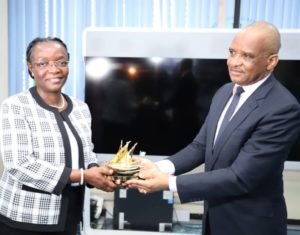
L-R: Director General, Nigerian Maritime Administration and Safety Agency (NIMASA), Dr Bashir Jamoh, OFR (left) presenting a souvenir to the Director Legal/ Board Secretary of Ghana Maritime Authority (GMA), Mrs. Patience Diaba during a study visit by members of the Ghana Maritime Authority at the NIMASA headquarters in Lagos.
Diaba opined that Ghana is privileged to have an opportunity to learn from the experience of Nigeria; stressing that the valuable insights would ensure Ghana avoids the pitfalls and challenges that plagued Nigeria at the initial stage.
Her words: “We appreciate the time and efforts of the NIMASA team who will be sharing their insights and expertise with us over the next few days. We look forward to a fruitful discussion and site visits, especially the visit to Port Harcourt and other activities that have been planned for us.”
“We are confident that our time will be rewarding and we will return to Ghana better informed and equipped to implement the Cabotage regime in our nation. We are excited to begin this 10-day study tour.”
In his welcome address earlier, the Executive Director, Maritime Labour and Cabotage Services, NIMASA, Engr. Victor Ochei observed that Nigeria’s Cabotage achievements did not come without pitfalls and struggles that were surmounted through consistency.
“Our achievements, processes, knowledge acquired and experience are what we will be sharing with you within this short period of time. Luckily, you will be gaining these set of skills without the inclusion of the pitfalls we had to learn from to attain our current level.”
“In the course of this under-study, we intend to chronologically take you on a historical sojourn and enlighten you on our famous “4 Pillars of Cabotage”. We shall put you through the enabling legislations and instruments that empower us to operate as well as our enforcement procedures amongst others,” Ochei said.
Maritime
Maritime Governance: Minister Deposits Three Accession Instruments At IMO
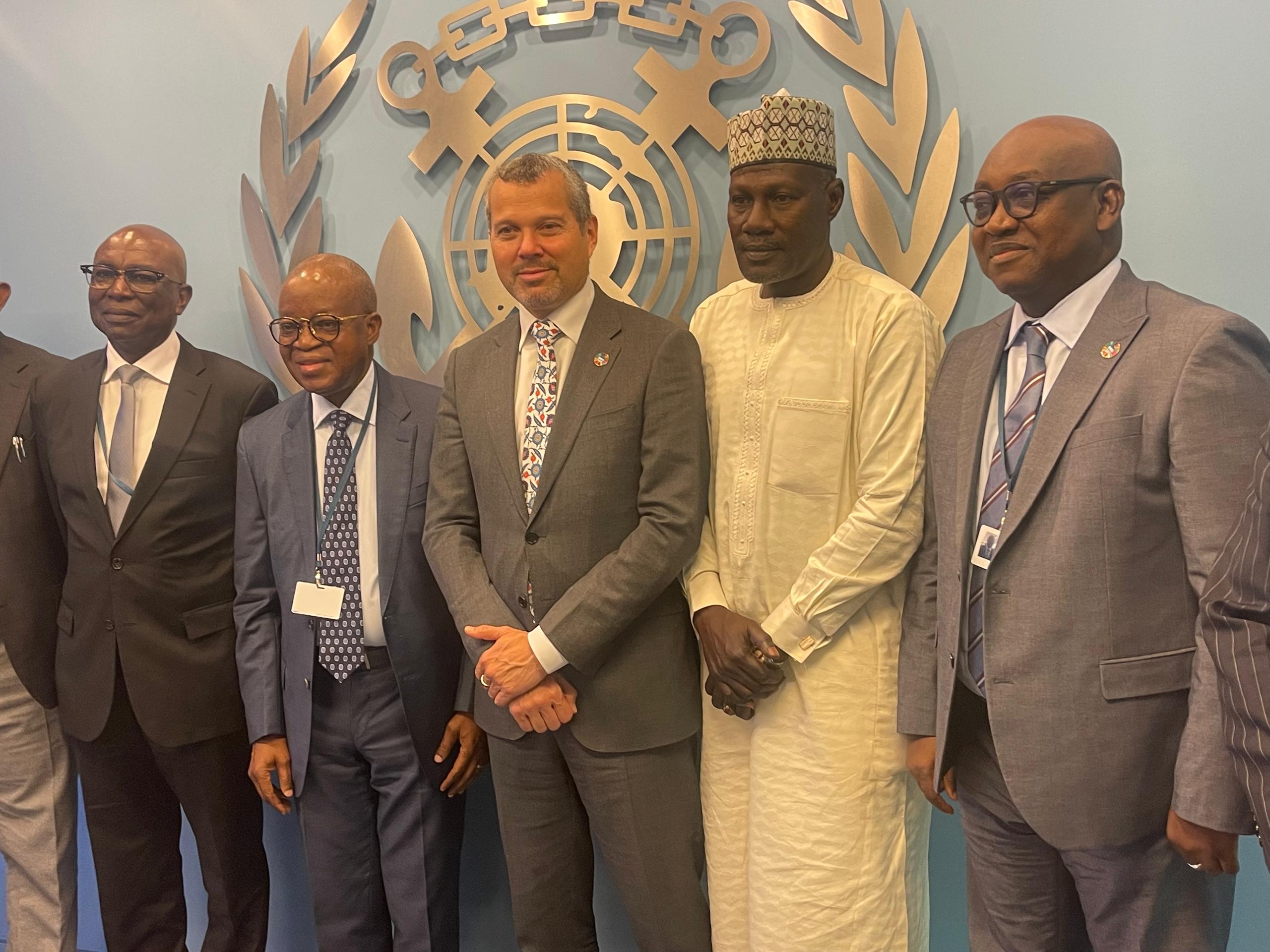
The Honourable Minister of Marine and Blue Economy, Adegboyega Oyetola has deposited three Instruments of Accession to IMO Conventions signed by President Bola Ahmed Tinubu with the global body.
He did so on Tuesday, at the headquarters of the International Maritime Organization (IMO), which acts as the repository for these conventions.
This move, coming a few weeks after Nigeria declared its intention to contest election for a seat on the IMO Council, is expected to enhance Nigeria’s maritime governance and align its practices with international standards, promoting maritime safety, security, and environmental protection.
Shortly after the presentation ceremonies, Oyetola informed the IMO Secretary General, Arsenio Dominguez, of the President’s commitment to ensuring that Nigeria aligns with international maritime standards regarding maritime safety, security, and sustainable marine practices.
ALSO READ: NNPCL Launches Utapate Crude Oil Blend, Eyes Production Expansion In 2025
He also called on the IMO to extend technical support to Nigeria.
In his words, “These instruments, duly acceded by His Excellency, the President of the Federal Republic of Nigeria, signify Nigeria’s continued commitment to aligning with international maritime standards, ensuring maritime safety and security, and promoting sustainable marine practices.
“We hereby request tailored technical cooperation under the Integrated Technical Cooperation Programme (ITCP) to enhance Nigeria’s compliance with IMO conventions and improve our maritime governance and implementation of the instruments we submitted today.”
On his part, Dominguez, acknowledged with appreciation the formal deposition of the Instruments of Accession, stating that it underscores Nigeria’s steadfast commitment to aligning with global maritime standards.
“I congratulate Nigeria for its exceptional efforts in acceding to these six critical IMO instruments. I encourage continued momentum by securing presidential assent to additional key conventions. We at the IMO remains fully committed to supporting Nigeria through technical cooperation and capacity-building initiatives to ensure the successful implementation of these instruments,” he stated.
The instruments Oyetola handed over to Dominguez include the instrument of accession to the 2005 Protocol to the Convention for the Suppression of Unlawful Acts against the Safety of Fixed Platforms Located on the Continental Shelf (SUA Protocol 2005), the instrument of accession to the International Convention on Standards of Training, Certification, and Watchkeeping for Fishing Vessel Personnel (STCW-F), and the instrument of accession to the Protocol Relating to Intervention on the High Seas in Cases of Pollution by Substances Other Than Oil (Intervention Protocol 1973).
It was gathered that three other Instruments of Accession signed by President Tinubu are undergoing further steps to complete the processes for their deposit.
Maritime
Capacity Dev’t: NIMASA Assures On Cabotage Vessel Financing Fund
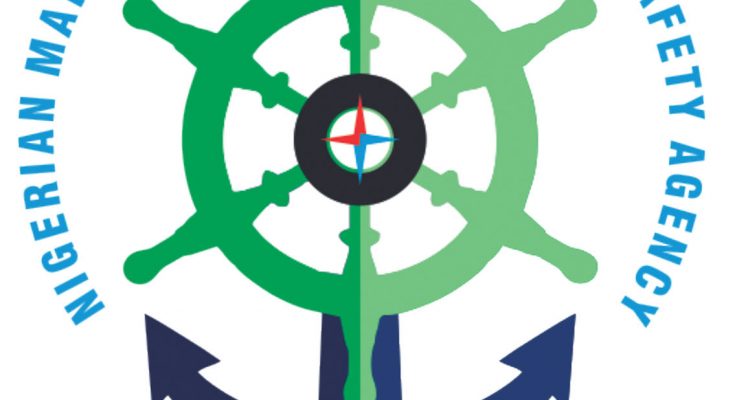
Funds accrued under the Cabotage Vessel Financing Fund (CVFF) are intact and currently held with the Central Bank of Nigeria (CBN) under the Single Treasury Account (TSA).
This assertion was made by the Nigerian Maritime Administration and Safety Agency (NIMASA), in a statement in Lagos on Tuesday.
The clarification became necessary to address “a misleading publication alleging that funds have disappeared from the CVFF account”.
ALSO READ: Okpebholo Hits Ground Running, Flags Off Edo’s 1st Flyover Bridge
The statement reads, in part, “The report of a missing money is both misleading and false.
“For the record, the Cabotage Vessel Financing Fund, securely held in the NIMASA account at the Central Bank of Nigeria (CBN), remains intact. There has been no disappearance of funds, and no illegal transactions, as the article suggests. This misinformation is a figment of the authors imagination, aimed at undermining NIMASA’s integrity, and mislead the public about the Agency’s operations.
“The Management of NIMASA will ensure that the CVFF is utilised in line with its statutory purpose. NIMASA Director General, Dr Mobereola has assured stakeholders of the safety of funds under the CVFF.”
The statement cited the DG thus, “Let us be clear that the CVFF account at the Central Bank of Nigeria is safe, intact, and secure. We at NIMASA will continue to manage it with the utmost responsibility, and there are no irregularities or illegal activities surrounding the funds. I urge the public to disregard this false narrative and to continue trusting the Agency’s ability to uphold the integrity of Nigeria’s maritime sector”.
It was gathered that the CVFF is a fund established under section 42 of the Coastal and Inland Shipping (Cabotage) Act 2003 to promote the development of indigenous ship acquisition capacity and to provide credit facilities to local maritime operators.
The NIMASA, assured of its commitment “to transparency, accountability, and the advancement of Nigeria’s maritime sector.”
Maritime
Okpebholo Hits Ground Running, Flags Off Edo’s 1st Flyover Bridge
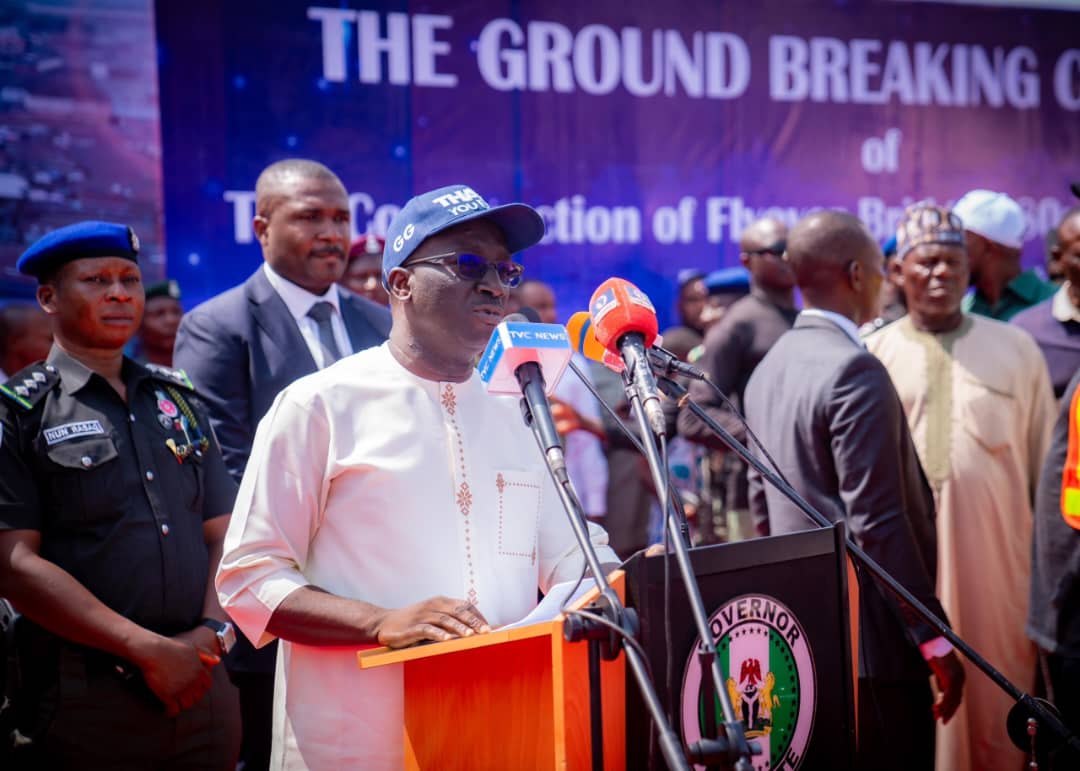
Edo State Governor, Senator Monday Okpebholo appears eager to deliver the dividends of democracy to his constituents.
This is discernible from the frenzy of activities being witnessed in his first few days on the job, including dissolution of boards, constitution of investigative panels, flagging off of infrastructure projects, among others.
In the bid to address the perennial road traffic congestion negatively impacting economic and social activities in Benin City, the state capital, Gov Okpebholo on Wednesday flagged off the construction of a flyover bridge.
Biztellers reports that the flyover bridge around the popular Ramat Park in the city centre is the first of such in the history of Edo State.
ALSO READ: Tinubu Seeks ₦1.767tn Loan to Tackle 2024 Budget Deficit
The Edo State Government made the disclosure in its verified handle on micro-blogging site, X, on Wednesday.
It wrote, “Traffic decongestion: Gov Okpebholo flags off first flyover in Edo.
“Edo State Governor, Sen. Monday Okpebholo has flagged off the construction of a flyover bridge at Ramat Park, Benin City, the State Capital, as part of immediate efforts to reduce traffic congestion in the city.”



